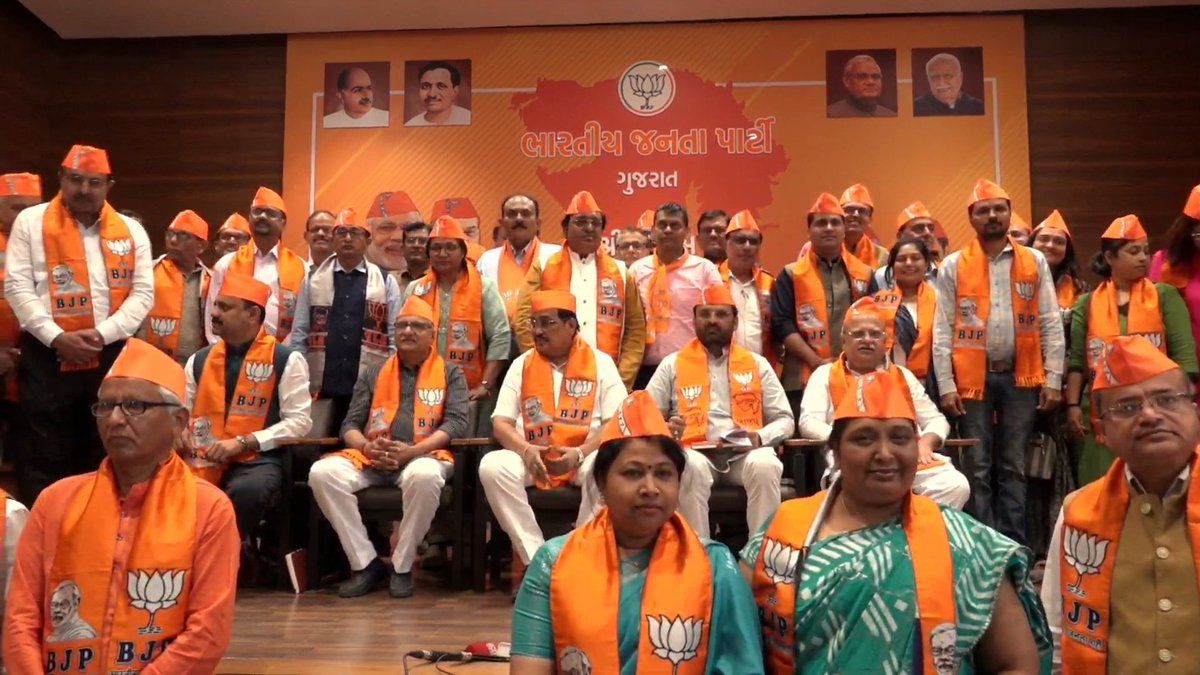Education Stalwarts Join Gujarat BJP, Signaling A Shift?
Leading the charge were esteemed figures like Dr. (Prof) Rajendra Jadhav, President of Gujarat Rajya Adhyapak Mandal, Dr. Bharat B. Solanki, Professor at Sardar Patel University (SPU), and Dr. P.D. Patel, a former professor at the same institution. Other notable names included Dr. Arvind Chaudhary, a former professor at Gujarat University (GU) and SPU, and Dr. J.P. Bodad, a current member of the SPU Senate. This influx of respected figures from the education sector has sparked debate and analysis, with many speculating on the potential impact on the upcoming elections.

Advertisement
Gandhinagar : In a move that could have significant implications for the state’s political landscape, several prominent academicians and educationists from Gujarat joined the Bharatiya Janata Party (BJP) on Tuesday. Over 250 teachers, professors, and former professors donned the saffron scarf, officially aligning themselves with the ruling party in the presence of Gujarat BJP Chief, C.R. Paatil, at the party headquarters in Gandhinagar.
Leading the charge were esteemed figures like Dr. (Prof) Rajendra Jadhav, President of Gujarat Rajya Adhyapak Mandal, Dr. Bharat B. Solanki, Professor at Sardar Patel University (SPU), and Dr. P.D. Patel, a former professor at the same institution. Other notable names included Dr. Arvind Chaudhary, a former professor at Gujarat University (GU) and SPU, and Dr. J.P. Bodad, a current member of the SPU Senate. This influx of respected figures from the education sector has sparked debate and analysis, with many speculating on the potential impact on the upcoming elections.
While the specific reasons behind each individual’s decision remain personal, the collective move suggests a growing alignment between certain sections of the academic community and the BJP’s ideology. Dr. Jagrutiben Unhja, joining from Umiya Sansathan, cited the party’s focus on “cultural values and nation-building” as a contributing factor. However, concerns regarding academic freedom and potential political interference in educational institutions have also been raised.
Professor Jaywantsinh Sarwaiya, President of the Gujarat State Principals’ Association, emphasized the need for collaborative efforts to improve the education system, stating, “We believe the BJP is committed to addressing the challenges faced by the education sector.”
While the BJP leadership welcomed the new members, opposition parties expressed skepticism. The Congress spokesperson Shailesh Parmar remarked, “This mass induction seems more about optics than genuine ideological shift. We urge the professors to prioritize academic independence and critical thinking over political affiliations.”
Only time will tell what the long-term ramifications of this influx will be. However, one thing is certain: the saffron wave sweeping through Gujarat’s academia has injected a new layer of complexity into the state’s political discourse. With elections on the horizon, both the BJP and the opposition will be closely monitoring how this development unfolds.
Advertisement

